Einleitung
Hier wird der Austausch des oberen Gehäuses gezeigt. Dafür musst du unter anderem Klebstoffentferner einsetzen, um den Akku zu entfernen.
Verwende den Akku nach dem Ausbau nicht wieder, er könnte ein Sicherheitsrisiko darstellen. Ersetze ihn mit einem neuen Akku.
iFixit Klebstoffentferner ist hochentflammbar. Setze ihn nur in gut belüfteten Räumen ein. Rauche nicht und arbeite nicht in der Nähe von offenem Feuer.
Um das Verletzungsrisiko zu reduzieren, solltest du den Akku deines MacBooks komplett entleeren. Ein geladener Lithium-Ionen-Akku kann entflammen, falls er aus Versehen beschädigt wird. Wenn dein Akku aufgebläht ist, triff Vorsichtsmaßnahmen.
Was du brauchst
-
-
Entferne die folgenden zehn Schrauben, mit denen das untere Gehäuse am oberen Gehäuse befestigt ist:
-
Zwei 2,3 mm P5 Pentalobe Schrauben
-
Acht 3,0 mm P5 Pentalobe Schrauben
-
-
-
Versuche mit den Fingern zwischen das obere und das untere Gehäuse zu kommen.
-
Ziehe das untere Gehäuse behutsam vom Oberen weg.
-
Entferne das untere Gehäuse und lege es zur Seite.
-
-
-
Das untere Gehäuse ist in der Mitte durch zwei Plastikklammern mit dem oberen Gehäuse verbunden.
-
-
-
Entferne die Plastikabdeckung über der Platine des Akkuanschlusses.
-
-
-
Entferne die folgenden Schrauben, mit denen die Platine des Akkuanschlusses am Logic Board befestigt ist:
-
Zwei 2,8 mm T6 Torx Schrauben
-
Eine 7,0 mm T6 Torx Paß-Schulterschraube
-
-
-
Mit einer Pinzette kannst du die Plastikabdeckung rechts an der Platine des Akkuanschlusses entfernen.
when doing this with metal tweezers as instructed in the video, it was difficult to get off and apparently while i was trying to do it, the tweezers went too far under and i believe made contact with the screw underneath? there was a zzz noise, an orange flicker and a little stream of smoke that came out. i freaked out and put everything back together to see if the laptop even still worked, it turned on and everything but died right away (i drained it before doing the repair anyway, so i was surprised it turned on at all).
i finished the battery repair and did several other things while in there. i have charged it all the way as recommended and will use it later on to see how everything is, im hoping that it’s a okay, but could someone explain to me what happened and the possible consequences?
-
-
-
Entferne die 6,4 mm T6 Torx Breitkopfschraube, mit der die Platine des Akkuanschlusses am Logic Board befestigt ist.
-
-
-
Ziehe die Platine des Akkuanschlusses vorsichtig vom Logic Board ab.
-
Es empfiehlt sich, die Batteriekabel nur leicht zu biegen, um die Platine über dem Logic Board und aus dem Weg zu halten.
-
-
-
Schnapp dir den Interposer mit einer Pinzette.
-
Hebe den Interposer aus dem Logic Board heraus und entferne ihn.
you must lift it absolutely vertically, or it fouls against the locator pin in the corner- you can easily get the impression that it won’t come over the end of this pin- almost like it’s rivetted in. it isn’t. get a good grip on it with the tweezers in the centre hole & one of the sides, & lift it STRAIGHT up.
I would recommend to use plastic tweezers in order to reduce risk of damage.
Second that. If you have thin heat shrink tubing, form some over the tweezer tips. If the tubing is thin and small enough in diameter you’ll see the serrations of the tweezer tips.
wat is the model this SSD
-
-
-
Mit dem flachen Ende eines Spudgers kannst du die rechte Seite des Anschlusses vom EA Board Datenkabel lösen.
-
-
-
Führe das flache Ende des Spudgers unter die linke Seite des EA Board Datenkabelanschlusses.
-
Drehe den Spudger vorsichtig hin und her, um den Anschluss des EA Board Datenkabels aus dem Stecker auf dem Logic Board zu lösen.
I also skipped this step as this data cable is not compromising the exchange of battery and less interaction with connectors is less risk of damage..
Diesen Schritt habe ich ebenfalls weggelassen, da das Datenkabel den Austausch der Batterie nicht behindert und weniger Manipulationen an Steckverbindern bedeutet ein geringeres Risiko für Beschädigungen
-
-
-
Hebe das EA Board Datenkabel ab und entferne es vom MacBook Pro.
-
-
-
Heble den SSD Kabelstecker mit dem flachen Ende eines Spatels von der Buchse auf dem Logic Board.
-
Schiebe den SSD Kabelstecker aus dem Weg.
As per my comment on step 10, this is also not required. When you remove the SSD in step 22, you can just fold it over out of the way.
This step is easy enough that I’d just remove it to be out of the way. I 100% agree with your other comments though. While you’re here, might as well do step 21 and remove the drive, just takes a sec.
I also strongly recommend not to unmount the speaker plugs, just flip them out of the way, same as with the SSD drive. Makes it much less complicated and less risky. It worked perfect for me.
Ich empfehle ebenfalls, die Platinenstecker der Lautsprecher nicht zu lösen sondern die Lautsprecher einfach, so wie das SSD-Laufwerk, einfach aus dem Weg zu legen. Das macht die Sache weniger kompliziert und weniger risikoreich. Es hat bei mir super funktioniert!
-
-
-
Fahre mit der Spudgerspitze unter den Kabelstecker des rechten Lautsprechers.
-
Ziehe den Kabelstecker des rechten Lautsprechers vorsichtig aus seiner Buchse auf dem Logic Board.
-
-
-
Entferne die folgenden Torx T5 Schrauben, die den rechten Lautsprecher am oberen Gehäuse befestigen:
-
Eine schwarze 6,8 mm Schraube
-
Eine silberfarbene 6,3 mm Schraube
-
Eine schwarze 4,9 mm Schraube
If you manage to misplace any screws, particularly one of the speaker retaining screws, look under the speakers - they are magnetic and great at hiding missing screws :)
-
-
-
Hebe den rechten Lautsprecher ab und entferne ihn aus dem oberen Gehäuse.
For those who don’t realize it, the speakers you are removing really are the plastic corner pieces that look like they’re just there to fill the space.
-
-
-
Heble das Kopfhöreranschlusskabel mit dem flachen Ende eines Spudgers aus seiner Buchse auf dem Logic Board.
For an easier, lower-risk repair, skip this step and step 18 - go straight to step 19 and fold the speaker out of the way.
Agreed, this is the way
-
-
-
Führe die Spitze eines Spudgers unter den Kabelstecker des linken Lautsprechers.
-
Heble den Kabelstecker des linken Lautsprechers vorsichtig aus seiner Buchse auf dem Logic Board.
It's easier to follow Step 19 & 20 first and then come to Step 18 (this step). Doing so will make it easier to remove that speaker connector easily holding the cable of speaker without having to use a pry tool.
-
-
-
Entferne die folgenden Torx T5 Schrauben, die den linken Lautsprecher am oberen Gehäuse befestigen:
-
Eine schwarze 6,8 mm Schraube
-
Eine silberfarbene 6,3 mm Schraube
-
Eine schwarze 4,9 mm Schraube
Be very careful on this step. If you aren’t you can snap the plastic on the corners where the screws go in. Remember to go slowly when spinning the screws back in, it doesn’t take gorilla torque to tighten them, just take it easy!
-
-
-
Drücke die Plastikfederleiste des SSD-Fachs mit dem Daumen (oder einem anderen Finger) ein, so dass die beiden Clips an der Vorderseite des Geräts frei werden.
-
Halte die Federleiste gedrückt und kippe die SSD Einheit aus ihrer Ausbuchtung.
-
-
-
Entferne die drei 2,2 mm T5 Torx Schrauben auf beiden Seiten des Akkus (also insgesamt 6 Schrauben).
If I were to do this again, I think I would leave unbolting the transverse battery until after ungluing the other four. That way one can tip the laptop on to one of its short sides and so run adhesive remover along the long edge of each battery and let gravity assist penetration without the transverse battery falling out.
I think this is good advice.
I just did one of these that didn’t have these screws installed from the factory. Odd
-
-
-
Lege eine Aluminiumfolie zwischen Display und Tastatur, um dein Display zu schützen. Die Folie sollte während des gesamten Arbeitsprozesses dort bleiben.
You can use a heat gun to remove the adhesive. Remember you can always add more heat so don’t over do it. I put my heat gun on high for less than 10 seconds at a time
Using a heat gun on a lithium-ion battery is not a good idea. You can get away with it if you are careful, but a solvent is much safer. ;)
-
-
-
-
Dein MacBook Pro ist jetzt gut vorbereitet, nun wird es Zeit, auch dich selbst vorzubereiten.
-
Wenn du mit dem Klebstoffentferner arbeitest und ihn aufbringst, solltest du immer deine Augen schützen. (Eine Schutzbrille ist in deinem Kit enthalten).
-
Insbesondere auch wenn du Kontaktlinsen trägst, musst du zusätzlich die Schutzbrille aufsetzen.
-
In deinem Kit sind auch Schutzhandschuhe enthalten. Wenn deine Haut empfindlich ist, solltest du die Handschuhe jetzt anziehen.
-
-
-
Ziehe den schwarzen Gummistopfen von dem Fläschchen mit Klebstoffentferner ab.
-
Schneide die verschlossene Applikatorspitze mit einer Schere ab.
-
-
-
Gib einige Tropfen des Klebstoffentferners gleichmäßig unter den Rand der am weitesten links liegenden Akkuzelle.
-
Warte 2-3 Minuten, bis der flüssige Klebstoffentferner unter die Akkuzelle eingedrungen ist, bevor du mit dem nächsten Schritt fortfährst.
If you use a heat gun be sure to point the heat gun away from the motherboard. After heating for 10 seconds or less use the blunt end of the metal pry tool as you don’t want to puncture the battery. You don’t need much force as after you have enough heat you will hear it unsticking when you pry at it lightly with the BLUNT end of the metal pry tool. Repeat this step on the other side. You don’t need to heat the cells near the motherboard as they are secured with small screws
I replace a lot of glued in Macbook batteries and you really do not need ISO to get them out. These wide blade plastic spudgers are brilliant and cheap. https://www.aliexpress.com/item/32824615... Image here https://imgur.com/a/0Y0Yvyj
May not need it to remove the battery, but it sure helps for removing the leftover residue and black VHB that’s left behind. I found that dousing the VHB and using a metal flat spatula helped.
Some good advice:
Use a iFixit plastic card/credit card (work from the short side of the computer) and stick it under the battery towards the glue strip and hold the card approx 45° (or whatever angle is appropriate) and drip the glue remover on the card so it slides/runs down the card underneath the battery. In this way the glue remover is aimed straight to the glue under the battery to ‘eat its way’ onto the glue. Let it do its job for a minute or two. Then you can dig in the card even more underneath (the angle of the card will obviously be less and less as you get further in; the idea is just to somehow slide the liquid under), add a bit more remover, dig a bit more, etc…
Otherwise the glue remover can get a bit all over the place but this way it is more easily directed towards the glue.
Goo Gone, applied with a pipette, is a non-flammable alternative solution for releasing the adhesive that won’t harm plastics if it seeps past the battery cavities. It does take a bit longer, 30-45 mins, but is much safer. An additional benefit is that the adhesive will be completely separated from the top-case, so cleanup is super quick.
Hi John,
We don’t recommend using Goo Gone because it’s a petroleum distillate based remover, which leaves an oily residue. The residue can prevent replacement adhesive from fully bonding with the surface. Be sure to clean any Goo Gone surface with a detergent-based cleaner.
Isopropyl alcohol and iFixit’s adhesive remover are formulated to evaporate quickly and leave little residue, which allows replacement adhesive to bond properly to the surface.
Note, per my later cleanup, I found that 2-3 drops may not be enough, or else, 2-3 minutes is too long to wait before trying to pry. Once the remover starts to dry, it is not as easy to work the adhesive. I ended up using maybe 1/10 of the bottle overall and most of that was liberally dousing the residue a few times to fully clean the case.
-
-
-
Setze das flache Ende eines Spudgers oder eine Kunststoffkarte unterhalb der am weitesten links liegenden Akkuzelle an.
-
Führe dein Werkzeug am unteren Rand der Akkuzelle entlang und hebe es an, so dass der Kleber beginnt, sich zu lösen.
This is the most difficult step. The tip of my spudger got bended and the aluminum case damaged it.
I also broke a spudger trying to do this. Eventually I figured out it is easier to go in diagonally from the corner, just to one side of the screw hole, and lever until you hear the adhesive pad tear and give way.
we use a hair dryer and gently blow hot air in between the battery for a good minute before trying to lift it with a spunger. It worked wonderfully! When lifting, just give it constant force upward and you'll hear the battery slowly breaking away from the macbook, and we don't even see glue residues on our macbook at all. Just be patient. :)
Just a note to say that the above comments were written before the liquid adhesive remover was added to the guide—you should definitely NOT be breaking any spudgers using the current procedure, which requires very little force. I recommend using plastic cards rather than spudgers—it's pretty easy to slide them under each battery cell and separate the adhesive once the solvent has done its work.
This is much easier to do using a plastic card. Just slide the card under the side of the battery and rock it back and forth. The battery will separate pretty quickly with minimal residue.
by a plastic card, do you mean a credit card type thing? thanks in advance.
Exactly—one of these or an old credit card should work fine.
I second this, I also used an old credit card and it totally worked! I did not use any heat or liquid
Some good advice:
Use a iFixit plastic card/credit card (work from the short side of the computer) and stick it under the battery towards the glue strip and hold the card approx 45° (or whatever angle is appropriate) and drip the glue remover on the card so it slides/runs down the card underneath the battery. In this way the glue remover is aimed straight to the glue under the battery to ‘eat its way’ onto the glue. Let it do its job for a minute or two. Then you can dig in the card even more underneath (the angle of the card will obviously be less and less as you get further in; the idea is just to somehow slide the liquid under), add a bit more remover, dig a bit more, etc…
Otherwise the glue remover can get a bit all over the place but this way it is more easily directed towards the glue.
My MBP identifies as late 2012/early 2013, and don’t know where you come up with a separate identity.
Looking at both disassembly procedures, neither shows the aftermarket (probably NewerTech or OWC) battery I found in this MBP.
That’s disconcerting; finds one asking myself - “Am I using the right procedure??”
if you know this might be the case, please add note to this step if the user finds only 4 physical cased batteries.
Tnx!
Use the plastic credit-card shaped card.
-
-
-
Setze den Spudger an der linken Seite der am weitesten links liegenden Akkuzelle an.
-
Führe den Spudger an der linken Seite der ganz linken Akkuzelle entlang.
-
Heble ganz leicht an der ganz linken Akkuzelle, um den Kleber zu lösen.
-
-
-
Wiederhole die obigen Schritte, um die danebenliegende Akkuzelle vom Kleber zu lösen:
-
Lasse einige Tropfen des flüssigen Klebstoffentferners unter die Akkuzelle laufen.
-
Warte 2-3 Minuten, damit der Klebstoffentferner ganz eindringen und den Kleber und aufweichen kann.
-
Zwänge vorsichtig einen Spudger oder eine Plastikkarte nach innen und achte dabei immer darauf, den Akku nicht zu beschädigen. Löse so die Akkuzelle von dem Kleber, mit dem sie am MacBook Pro befestigt ist.
-
-
-
Setze das flache Ende eines Spudgers unter der größeren ganz links gelegenen Akkuzelle.
-
Zwänge den Spudger vorsichtig nach innen und achte darauf, die Akkuzellen dabei nicht zu beschädigen.
-
Heble die größere ganz links gelegene Akkuzelle nach oben aus dem oberen Gehäuse heraus.
-
-
-
Fasse die Akkuzellen nun mit der Hand und bewege sie vorsichtig aus ihrer Einbuchtung im oberen Gehäuse heraus, entferne sie aber noch nicht.
-
Lasse die Akkuzellen auf dem oberen Gehäuse liegen, so wie im dritten Bild zu sehen ist.
-
-
-
Wechsle die Seite und wiederhole den obigen Vorgang mit den beiden Akkuzellen auf der rechten Seite des MacBook Pros.
-
Denke daran, ein wenig von dem flüssigen Klebstoffentferner unter jede Akkuzelle zu träufeln und dann etwa 2-3 Minuten einweichen zu lassen, bevor du die Akkuzelle heraushebelst.
Puncturing the battery’s protective covering can lead to release of caustic fumes or fire.
-
-
-
Hebe den Akku nun als Ganzes aus dem oberen Gehäuse heraus und entferne ihn.
-
Mit etwas Glück kannst du jeden einzelnen Klebestreifen langsam mit den Fingern abziehen.
-
Falls das nicht klappt, träufle etwas Klebstoffentferner auf jeden Klebestreifen und lasse ihn 2-3 Minuten einwirken. Dann kannst du die Klebestreifen mit einem Plektron oder einem anderen geeigneten Werkzeug aus deinem Kit abkratzen. Das ist etwas langwierig, hier hilft dir nur Geduld!
-
Wische den restlichen Klebstoffentferner ab und lass dein MacBook Pro ein paar Minuten an der Luft trocknen.
-
Kalibriere deinen neu eingebauten Akku: Lade ihn auf 100% und lasse ihn mindestens zwei weitere Stunden am Ladegerät. Ziehe den Stecker und benutze dein MacBook normal, um den Akku zu entladen. Wenn die Ladeanzeige am Minimum ist, dann speichere ab und lasse den Laptop an, bis er von selbst ausgeht. Warte wenigstens 5 Stunden und lade ihn dann auf 100% auf.
During battery replacement take care to position the two left and right battery packs inwards and upwards towards the macbook center such, that there is sufficient space for reinstallation of the two speakers!
I second Fred’s suggestion. I had to “smoosh” the right speaker in since my battery replacement was a little bit too far over. It was fine, but the “heads up” note is warranted.
If you're replacing the top case that includes a new battery, can't you skip removal of the battery?
Yes!! If uppercase Assembly(Includes Trackpad, keyboard, Palmrest & BATTERY) is being replaced, there is no need to remove battery from old uppercase assembly.
When you are at this step and before you put the new battery in, take the time to clean your computer really well. You will be surprised how much dust/dirt and even pet hairs have gotten into your computer. After I removed the battery, I use a little more of the acetone to clean the bays up and after it dried, I used a tiny bit of Isopropyl Alcohol to make sure there was a good clean area for the new bonding. Make sure you clean the fans. Don’t use a toothbrush or anything like that. If your have a Lowes or Home Depot, you can buy a shop vac attachment kit for about $20, it’s well worth it. Don’t use that air in a can crap, it will put moisture on circuits. Take your time, it’s not a hard task to do everything, just use a little patience.
Hi all,
After installing the new batteries, my mac is not powering up… Do i need to charge the battery first and then check again? Have anyone faced similar issue before?
My 1st battery from ifixit came out to be defective and it caused fire at the centre of the long battery. I have got a replacement for the defective piece which i have installed now. However, now i am worried that connecting to power could lead to any potential fire / harm to my mac???
Already i have spent lot of time in this and it would be very upsetting if this battery spoils my mac!!!
Any suggestion people???? thanks in advance!
BR,
Vijay
Hi Vijay!
Uh-oh, we’re sorry to hear about the battery trouble!
Our batteries come with a 1-year warranty, so this would definitely be something we can assist with. Please feel welcome to reach out via help.ifixit.com and provide our Support team with your order number so that they can look into these battery troubles with you.
Thanks!
Hi All,
Just replaced battery, and am typing this on the live MacBook. The unit fired up as soon as I plugged in the power adapter. Nice. The battery percentage indicator said the battery had approximately 85% power charge. Is this normal? If not, what steps should I take to ensure that this battery is properly calibrated?
Cheers,
James
Hi James,
Follow these steps to calibrate your new battery: https://help.ifixit.com/article/265-batt...
ご指摘ありがとうございました!訂正済みです。
Can someone tell me which model is written in the battery? I saw that is written the model a1437. Is this model compatible with the a1425? Thanks
Hi Mizuno,
The battery model is A1437, and it is compatible with the MacBook Pro model A1425.
These instructions are brilliantly concise! Thank you. And thank you everyone for your comments. As a final comment from me, it is much easier to assess the final position of the batteries if you place them gently in position, reinstall the speakers, adjust the battery position if needed and then press them firmly into place.
I did everything in the kit, but my computer won’t acknowledge the battery and is only running on my power adapter. Once I take off the power adapter it shuts down. I also tried resetting the snc, but unsure if it did anything. I reopened up the back to see if I missed anything. The batteries are warm, which means they were running. I’m very confused, anybody else run into similar issues?
My OEM adhesive was particularly persnickety and did not want to come up. I found a pick to be more useful than the flat spudger or the card. I also used several applications of remover and found that working with it wet was much more effective than letting it dry to dissolve the glue. A final few wipes with more remover and the cloth wipe that came with the kit did a good cleanup job.
So I just replaced the battery and reassembled everything and when plugging it into the power supply, the LED is not lighting up and computer is not turning on. Not sure what I did incorrectly as I basically followed the steps in reverse for reassembly after installing the battery. Any advice would be appreciated.
-
-
-
Drücke die Kanten des I/O Board Steckers mit der Spudgerspitze gerade aus seinem Anschluss auf dem Logic Board.
-
-
-
Drücke mit der Spudgerspitze den Stecker am iSight Kamerakabel gerade aus seinem Anschluss auf dem Logic Board.
-
-
-
Schiebe das flache Ende des Spudgers unter den Stecker der Tastaturbeleuchtung und das Logic Board.
-
Drehe das flache Ende des Spudgers vorsichtig nach oben und hebe so den Stecker der Tastaturbeleuchtung aus seinem Anschluss auf dem Logic Board.
-
-
-
Klappe mit dem flachen Ende des Spudgers den Sicherungsbügel am ZIF Anschluss des Flachbandkabels zum Trackpad hoch.
-
Fasse die Plastikzuglasche und ziehe das Flachbandkabel zum Trackpad aus seinem Anschluss heraus.
-
-
-
Klappe den Sicherungsbügel am ZIF Anschluss des Flachbandkabels zur Tastatur mit der Spudgerspitze hoch.
-
Fasse die Plastikzuglasche und ziehe das Flachbandkabel zur Tastatur aus seinem Anschluss heraus.
-
-
-
Klappe den Sicherungsbügel am ZIF Anschluss des Flachbandkabels zum Mikrofon mit der Spudgerspitze hoch.
-
Fasse die Plastikzuglasche und ziehe das Flachbandkabel zum Mikrofon aus seinem Anschluss heraus.
-
-
-
Fasse die schwarze Plastiklasche an, welche am Verschluss des Displaydatenkabels angebracht ist, und drehe sie in Richtung der Seite mit dem Stromanschluss (DC-In) des Computers.
-
-
-
Drücke vorsichtig den Stecker am Displaydatenkabel an den Kanten aus seinem Anschluss auf dem Logic Board heraus.
-
Ziehe den Stecker des Displaykabels aus dem Anschluss, aber entferne ihn nicht. Schiebe ihn vorsichtig aus dem Weg.
-
-
-
Klappe mit der Spudgerspitze den Sicherungsbügel am ZIF Anschluss des Flachbandkabels zum linken Lüfter hoch.
-
Ziehe sorgfältig das Flachbandkabel zum linken Lüfter aus seinem Anschluss heraus.
-
-
-
Schiebe das Flachbandkabel zum linken Lüfter zur Seite. Dadurch wird eine versteckte Schraube sichtbar, welche die Logic Board Einheit am oberen Gehäuse befestigt.
-
-
-
Entferne folgende Schrauben, welche das Logic Board am oberen Gehäuse befestigen:
-
Acht 3,3 mm Torx T5 Schrauben
-
Eine Kreuzschlitzschraube #00
-
Zwei 3,1 mm Torx T5 Schrauben
-
Entferne zwei weitere Schrauben vom MagSafe DC-in Board in der rechten oberen Ecke (zweites Bild)
-
Zwei 3,4 mm Torx T5 Schrauben
I just hit this step. The Philips that worked for me was the #000. Thank you so much for this tutorial.
-
-
-
Hebe die Logic Board Einheit an ihrer linken Seite hoch und hole sie aus dem oberen Gehäuse. Denke dabei daran, dass sich beim Ausbau keine Kabel oder I/O Anschlüsse verfangen.
-
Ziehe die rechte Seite des Logic Boards mit den I/O Anschlüssen weg von der Seite des oberen Gehäuses und entferne die Logic Board Einheit.
-
-
-
Hebele die drei Antennenstecker mit dem flachen Ende des Spudgers hoch und entferne sie von der AirPort Karte.
-
Das Kabel mit der langen Hülle mit dem mittleren Anschluss
-
Das Kabel mit der kurzen Hülle mit dem Anschluss neben der Schraube
-
Das letzte Kabel hat keine Hülle und wird am letzten leeren Anschluss neben dem Lüfter eingesteckt.
-
-
-
Entferne folgende zwei Schrauben, welche das I/O Board am oberen Gehäuse befestigen:
-
Eine 3,53 mm Torx T5 Schraube
-
Eine 4,89 mm Torx T8 Abstandshalterschraube
-
-
-
Ziehe vorsichtig das I/O Board aus seiner Vertiefung im oberen Gehäuse heraus und entferne es.
-
-
-
Entferne die zwei 3,4 mm Torx T5 Schrauben, welche die Kopfhörerbuchse am oberen Gehäuse befestigen.
-
-
-
Hebe mit einer Pinzette die Gummiabdeckungen über dem rechten und linken Displayscharnier ab.
-
-
-
Entferne die 3,2 mm Torx T5 Schrauben (eine auf jeder Seite), welche die Aluminiumhalterungen der Scharniere am oberen Gehäuse befestigen.
-
-
-
Hebe mit einer Pinzette die Aluminiumhalterungen des linken und rechten Displayscharniers hoch.
-
-
-
Entferne die vier inneren 5,3 mm Torx T8 Schrauben (zwei auf jeder Seite), welche das Display am oberen Gehäuse befestigen.
-
-
-
Halte das Display und das obere Gehäuse mit der linken Hand zusammen fest und entferne die letzte T8 Torx Schraube von der unteren Displayhalteklammer.
-
Entferne die letzte Torx T8 Schraube, welche das Display noch am oberen Gehäuse befestigt.
-
-
-
Fasse beide Hälften des Gerätes, eine in jede Hand.
-
Schiebe die untere Hälfte des Gerätes vorsichtig nach vorne, um sie von der Displayeinheit zu trennen.
-
Lege jedes Teil zur Seite. Achte darauf, dass die untere Hälfte mit der Tastatur nach unten liegt.
-
-
-
Entferne folgende Schrauben, welche das Trackpad am oberen Gehäuse befestigen:
-
Vier 1,4 mm Kreuzschlitzschrauben #000
-
-
-
Schiebe den Spudger zwischen das Flachbandkabel zum Trackpad und dem oberen Gehäuse.
-
Lasse den Spudger entlang der Unterseite laufen und löse so das Flachbandkabel zum Trackpad aus der Klebeverbindung zum oberen Gehäuse.
-
-
-
Setze die Spudgerspitze zwischen das Flachbandkabel zum Trackpad und dem oberen Gehäuse.
-
Ziehe das Flachbandkabel zum Trackpad vorsichtig mit der Spudgerspitze aus den Ausschnitt oben in der Einbuchtung der SSD.
-
-
-
Wenn das Trackpad vom oberen Gehäuse befreit ist, kannst du das Flachbandkabel zum Trackpad durch den Ausschnitt im oberen Gehäuse herausfädeln.
-
Entferne das Trackpad vom oberen Gehäuse.
-
-
-
Bei diesem Schritt empfiehlt es sich, mit einem Heißluftgebläse oder einem Haartrockner den Kleber aufzuweichen, der die Mikrofoneinheit am oberen Gehäuse befestigt. Du kannst es auch ohne Wärme probieren, riskierst aber Schäden am Mikrofonkabel.
-
Stelle die Wärmestufe auf niedrig ein und erwärme die Mikrofoneinheit, so dass sich die Klebeverbindung zum oberen Gehäuse löst.
-
-
-
Entferne mit der Spudgerspitze das Stück Klebeband, welches eines der beiden Mikrofone bedeckt.
-
Fasse das Stück Klebeband mit einer Pinzette und entferne es.
-
-
-
Wiederhole diesen Schritt für das Stück Klebeband auf dem zweiten Mikrofon und entferne es.
-
-
-
Schiebe die Spudgerspitze unter das Kabel zur Mikrofoneinheit.
-
Lasse den Spudger an der Unterseite des Kabels zur Mikrofoneinheit entlang laufen, um es vom oberen Gehäuse zu trennen.
-
-
-
Schiebe die Spudgerspitze vorsichtig unter das zweite Mikrofon und drücke nach innen, um den Kleber zu lösen.
-
-
-
Das obere Gehäuse bleibt übrig.
-
Um dein Gerät wieder zusammenzusetzen, folge den Schritten in umgekehrter Reihenfolge.
Um dein Gerät wieder zusammenzusetzen, folge den Schritten in umgekehrter Reihenfolge.
Rückgängig: Ich habe diese Anleitung nicht absolviert.
14 weitere Nutzer:innen haben diese Anleitung absolviert.
Besonderer Dank geht an diese Übersetzer:innen:
100%
Diese Übersetzer:innen helfen uns, die Welt zu reparieren! Wie kann ich mithelfen?
Hier starten ›
2 Kommentare
If uppercase Assembly(Includes Trackpad, keyboard, Palmrest & BATTERY) is being replaced, there is no need to remove battery from old uppercase assembly.













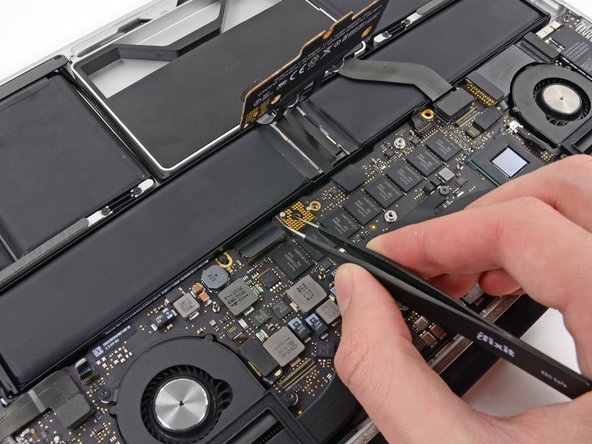

































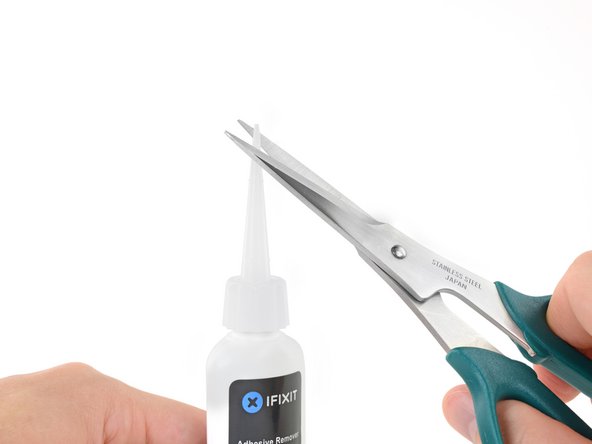





















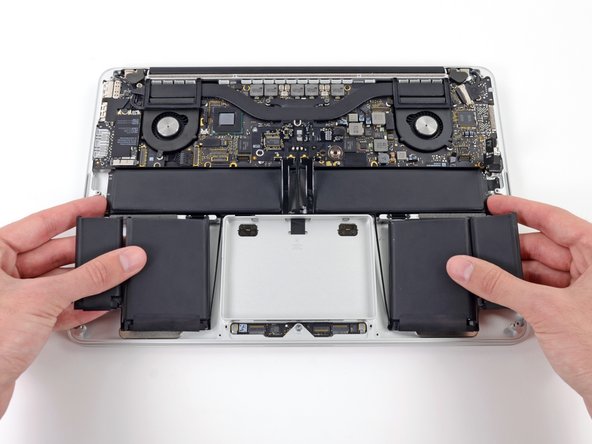

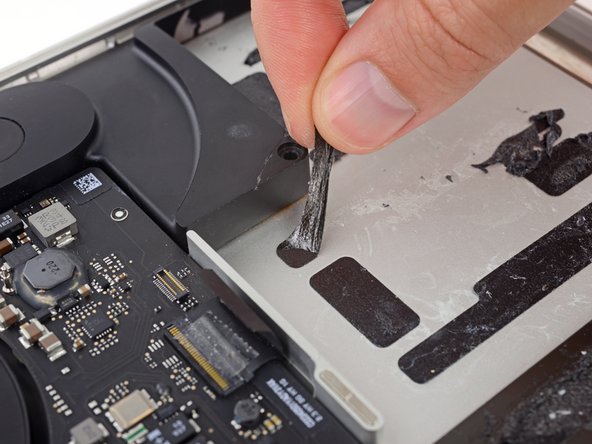

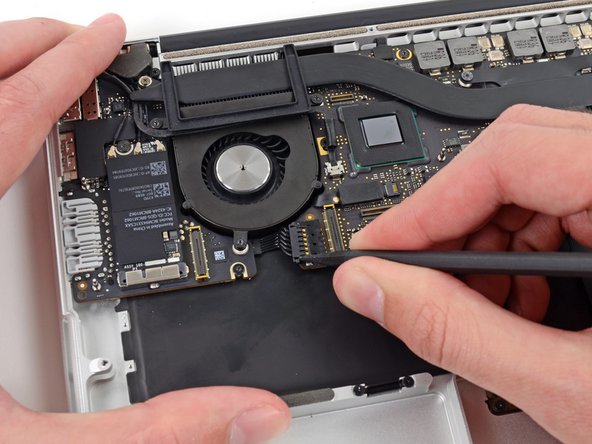

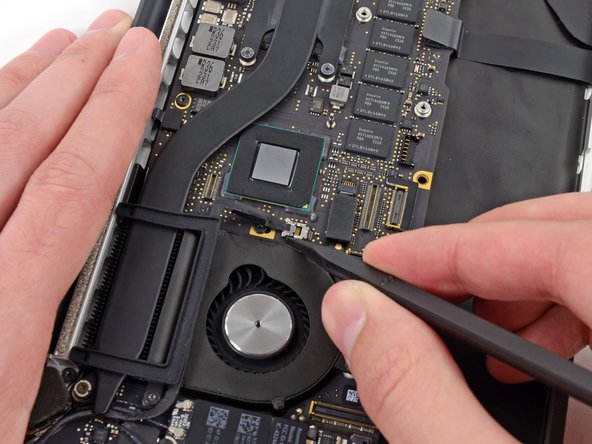

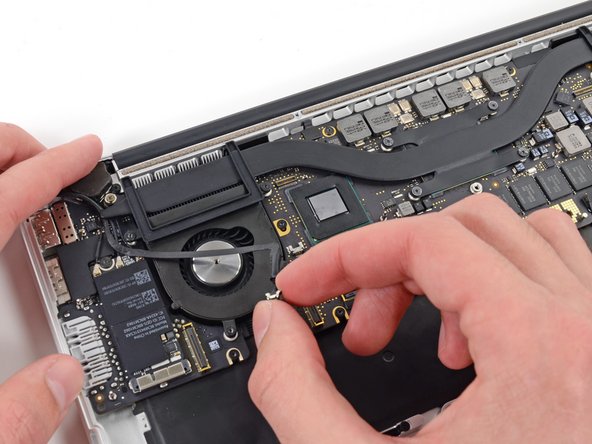

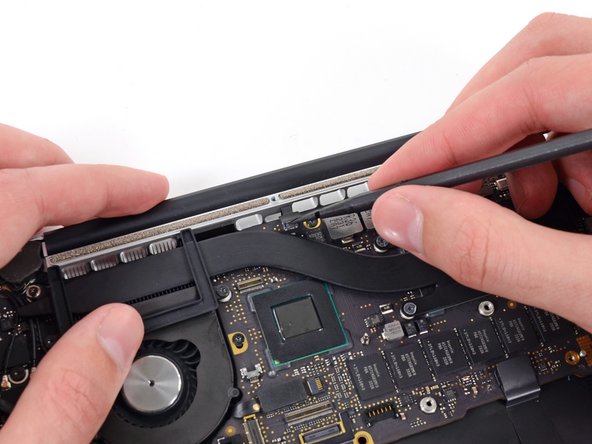

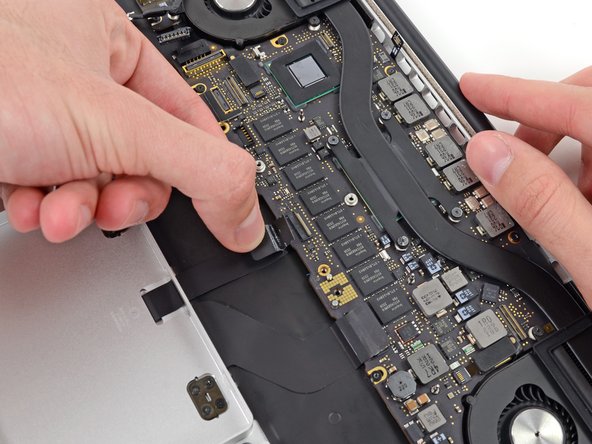

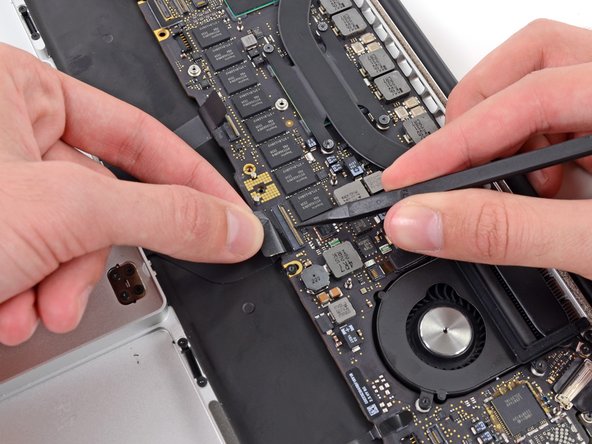
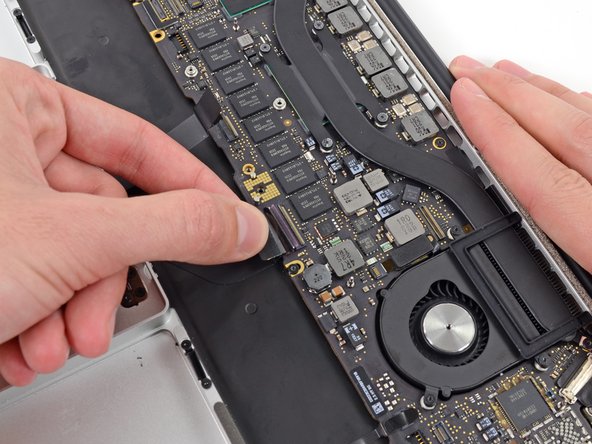

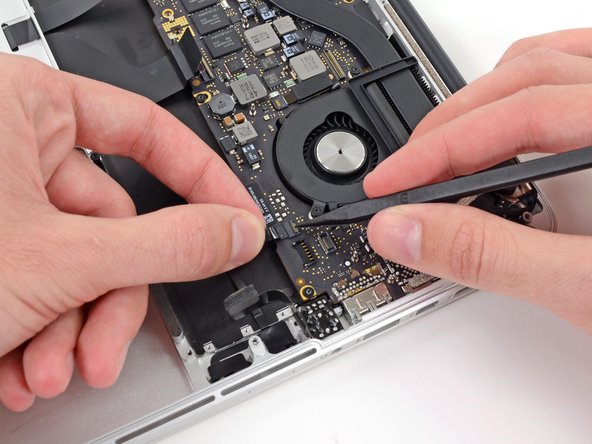
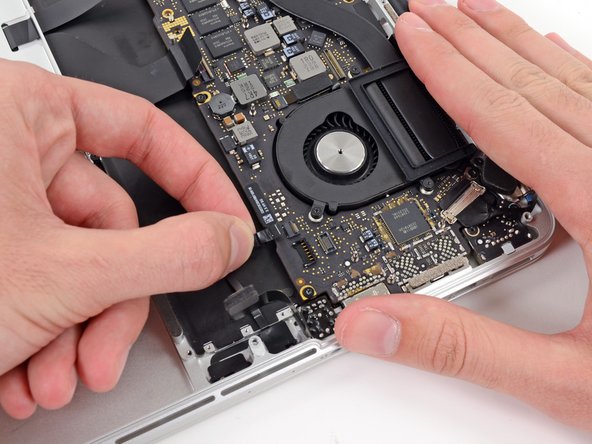

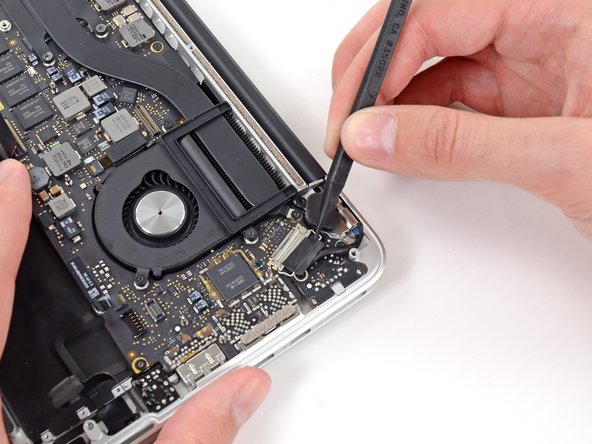

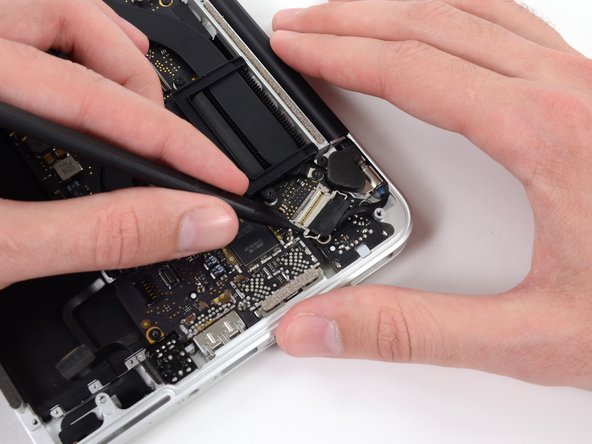
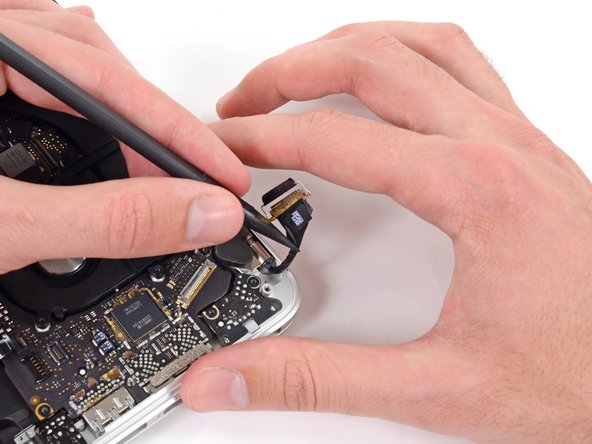

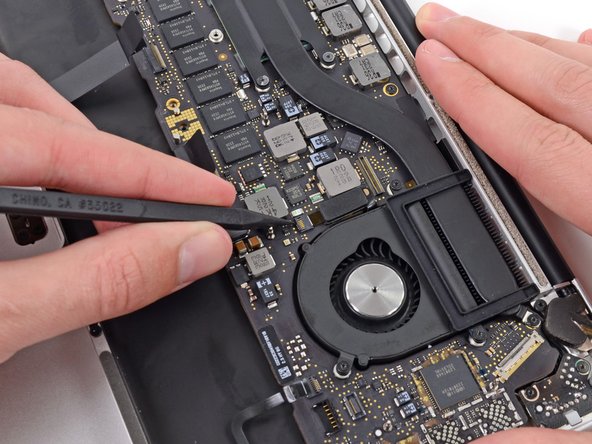
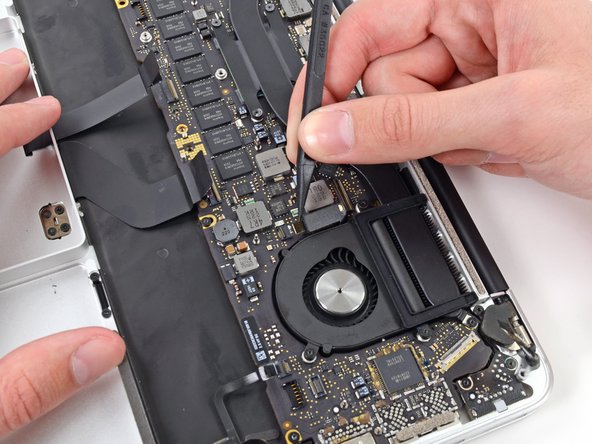

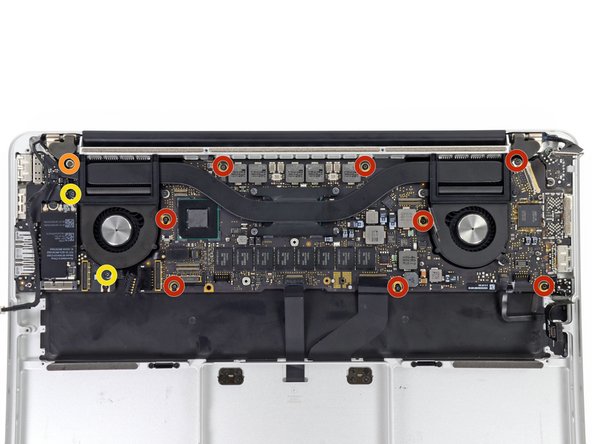
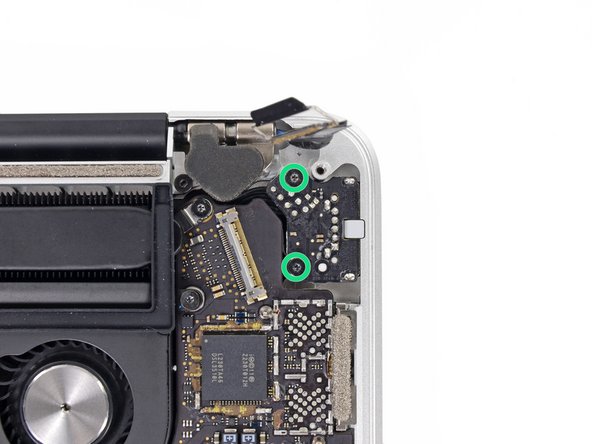

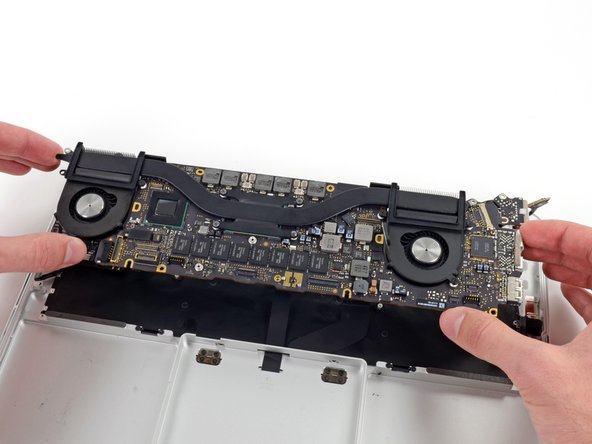

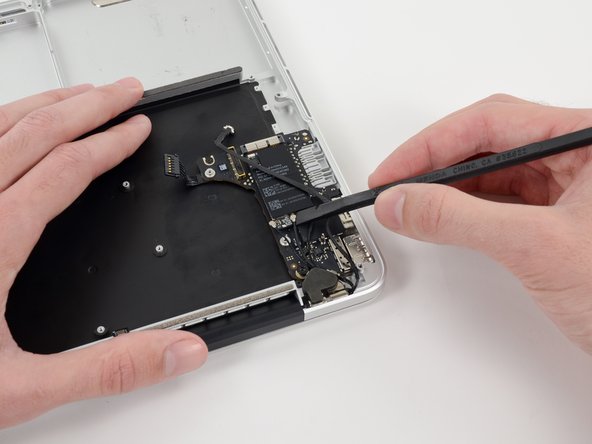



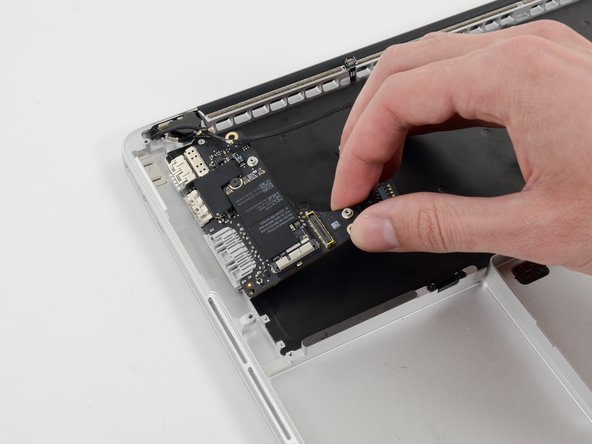


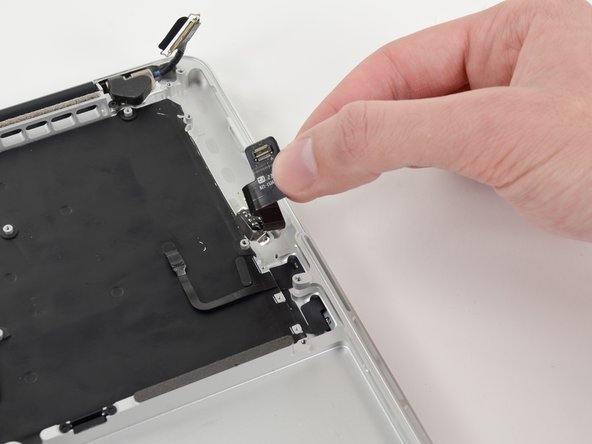





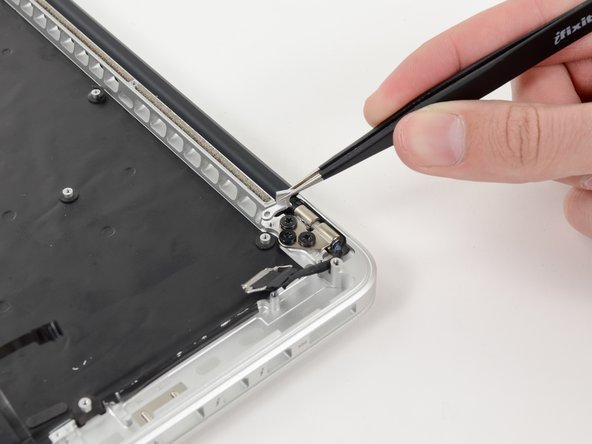

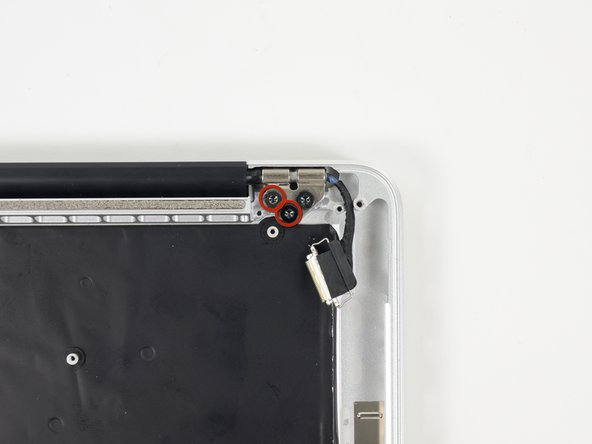

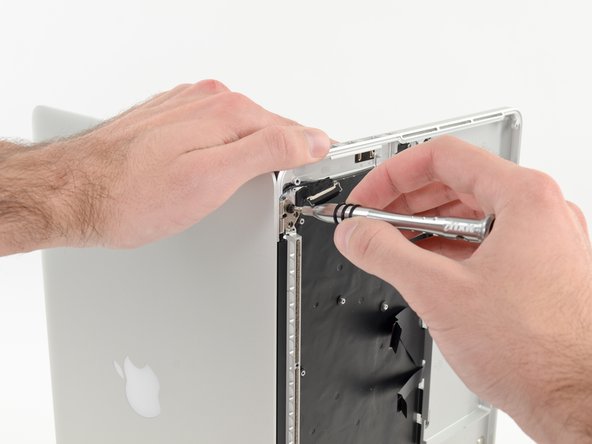

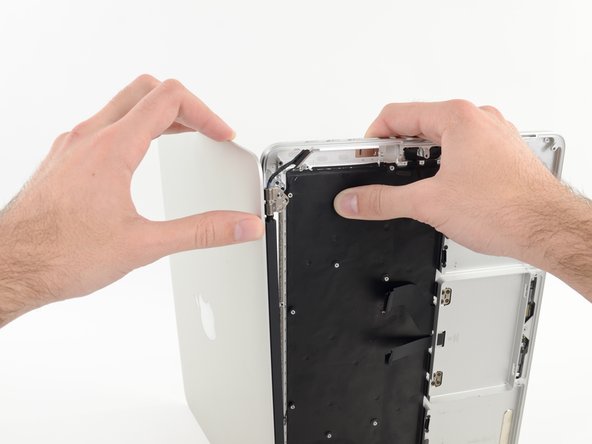
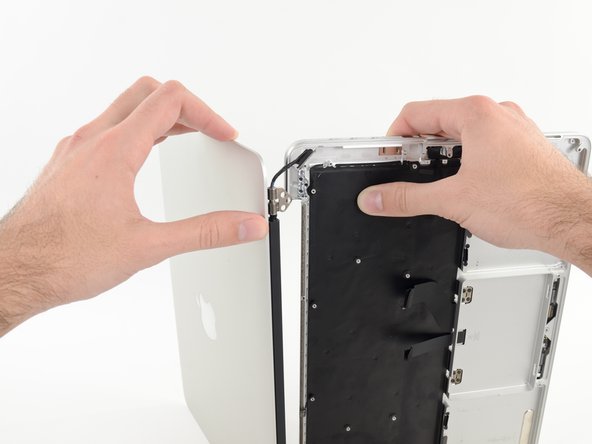




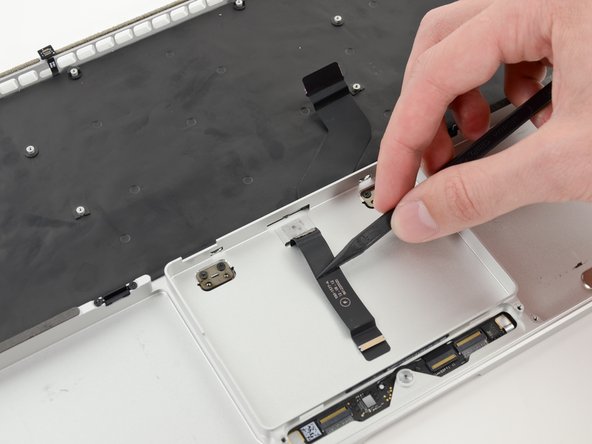

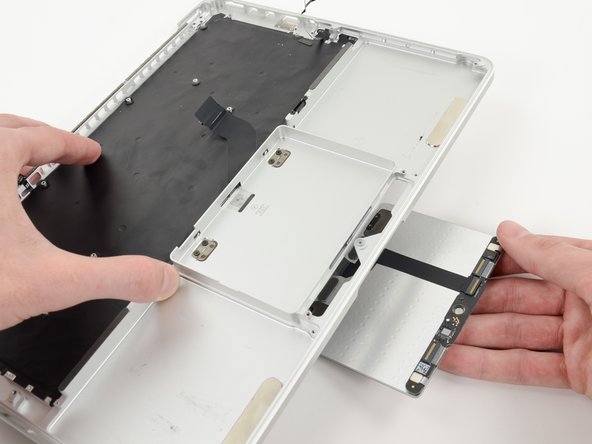



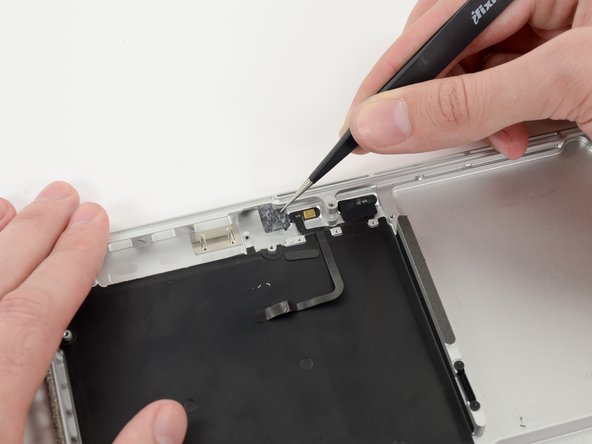




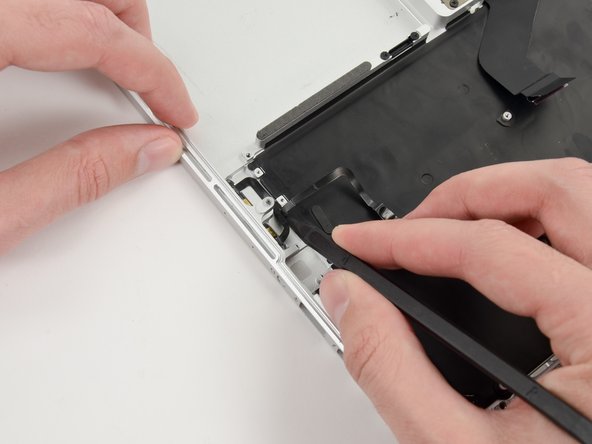
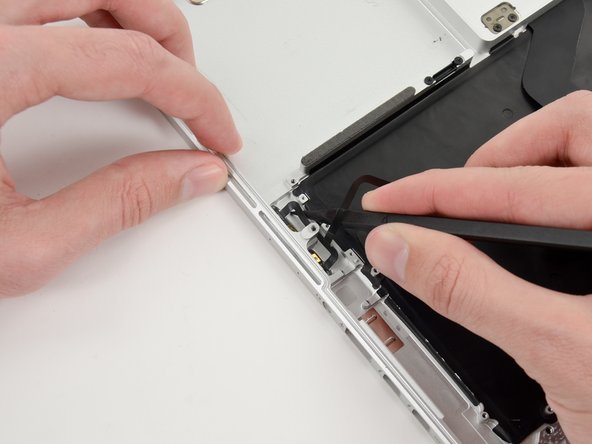

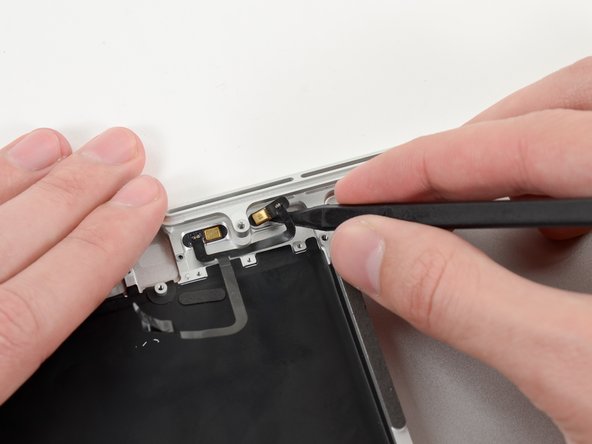

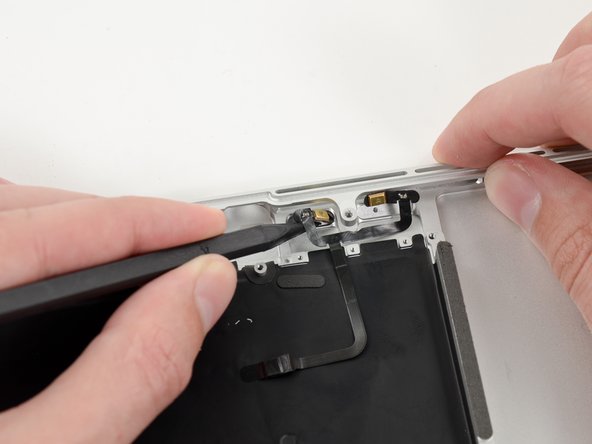





If don’t have one of those neat project mats, then you can use small pieces of flattened blu-tack to hold the screws. If you arrange them in the shape of your mac book cover, and put the screws down methodically, you can get a one-to-one mapping of the screws to the correct screw holes.
Toby Thurston - Antwort
Or you can use an ice tray where you put the screws and the parts in separate bays in the same order as they come in the instructions.
timofej.se -
This is great! I used a small magnetic white board, and wrote on it to identify the parts as I went. This whole process, from the fast shipment to the great instructions to the complete, high quality, tool kit has been great. I’m typing this comment on my resurrected laptop. Thank you! Sue
Susan Greer - Antwort
It would be a good idea if people recorded in the comments which screws go where so that, if someone lost their screw positions, they could recover them from the comments.
Raymond Shpeley - Antwort